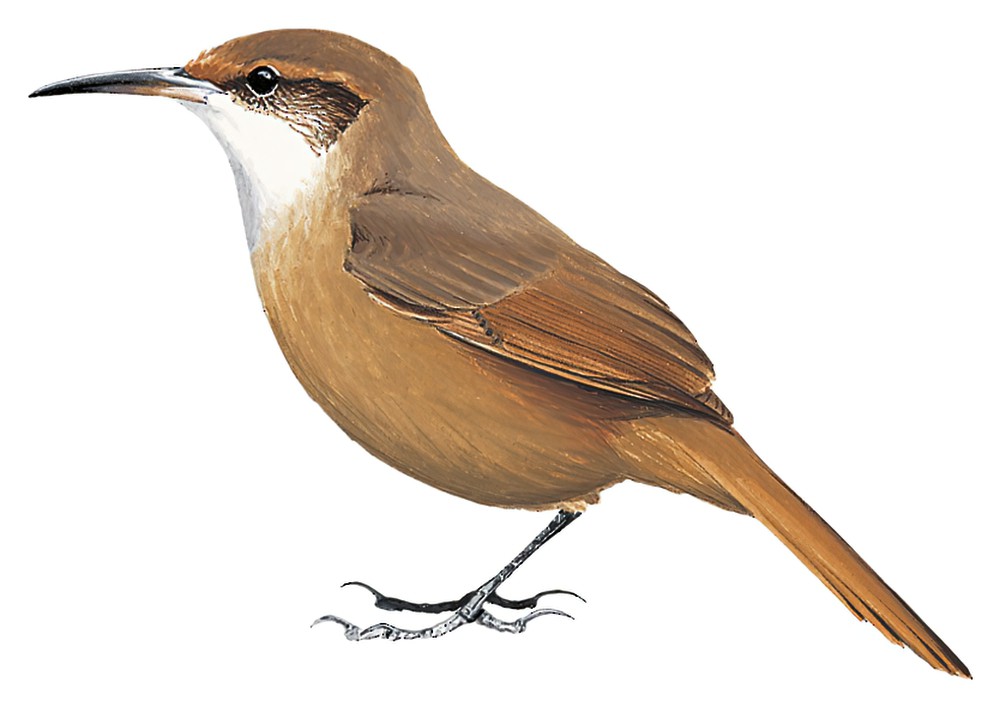Chaco Earthcreeper / Tarphonomus certhioides

Chaco Earthcreeper
SCI Name:
Protonym: Anabates certhioides Mag.Zool. 8 cl.2 p.15
Taxonomy: Passeriformes / Furnariidae / Tarphonomus
Taxonomy Code: chaear1
Type Locality: Corrientes, Argentina.
Author: d''Orbigny & Lafresnaye
Publish Year: 1838
IUCN Status: Least Concern
DEFINITIONS
TARPHONOMUS
(Furnariidae; Ϯ Chaco Earthcreeper T. certhioides) Gr. ταρφος tarphos thicket; νομος nomos dwelling, residence; "Tarphonomus, genus nov. Type species.-- Anabates certhioides d'Orbigny & Lafresnaye, 1838. ... Etymology.-- The generic name, from the Greek tarphos (thicket) and nomos (place or condition for living), denotes the habitat typical of T. certhioides and T. harterti, which prefer thickets in arid scrub. The name is masculine in gender and emphasizes the distinctness of the habitat of these species from those of their former congeners in Upucerthia, which typically occupy more open arid scrub or grassland" (Chesser & Brumfield 2007).
certhioides
Genus Certhia Linnaeus, 1758, treecreeper; Gr. -οιδης -oidēs resembling; "G. ANABATES. ... 4. A. certhioides, Nob. — Affinis hæc species forma rostri elongati, tenuis et arcuati, generibus Certhiæ aut Dendrocolapti; sed differt rectricibus apice mollibus et late rotundatis pedibusque omnino diversis. ... Hab. Corrientes, rep. Argentina." (d'Orbigny & de La Fresnaye 1838) (Tarphonomus).
SUBSPECIES
Chaco Earthcreeper (estebani)
SCI Name: Tarphonomus certhioides estebani
estebani
Dr Juan Gerónimo Esteban (b. 1920) Argentinian zoologist (subsp. Tarphonomus certhioides, subsp. Xiphocolaptes major).
Chaco Earthcreeper (luscinia)
SCI Name: Tarphonomus certhioides luscinia
LUSCINIA
(Muscicapidae; Ϯ Common Nightingale L. megarhynchos) L. luscinia nightingale, glorious songstress < cluere to be famous; canere to sing; in European folklore the Common Nightingale and the Thrush Nightingale L. luscinia vie for the title of best songstress; "101 SYLVIA LVSCINIA. Luscinia Aedon? Nightingale, Le Rosignol, Nachtigall, or Philomela." (T. Forster 1817); "Luscinia Forster, 1817, Synop. Cat. Brit. Birds, p. 14. Type, by monotypy, "Sylvia luscinia" = Luscinia megarhynchos Brehm." (Ripley in Peters 1964, X, 32).
Synon. Aedon, Aedonis, Daulias, Lusciola, Oitrus, Pandicilla, Philomela.
● (?syn. Vireo Ϯ Black-whiskered Vireo V. altiloquus) "* Luscinia, s. philomela Americana; the yellow hooded titmouse." (Bartram 1792); "α. Luscinia seu philomela americana. The yellow hooded titmouse. Die Amerikanische Nachtigall. CATESBY." (Zimmermann 1793); "Catesby did not describe or figure the "American Nightingale," but Edwards (Nat. Hist. vol. 3, p. 121) did, and as Zimmermann was citing his reference from Seligmann's work, where the figures and descriptions from Edwards and Catesby are badly mixed, it is not surprising that this is quoted as from Catesby. This particular bird is in need of further investigation, as it is one of the chief references on which Motacilla calidris Linnaeus is founded. It requires strong imagination to see in Edwards's plate 121 the bird we now know as Vireosylva calidris." (Richmond 1917); "Vireo altiloquus ... Messrs. Bangs and Penard (Bull. Mus. Comp. Zool., 67, p. 206, 1925) have clearly pointed out that Motacilla calidris Linnaeus (Syst. Nat., 10th ed., 1, p. 184, 1758), principally based upon "The American Nightingale" of Edwards (Nat. Hist. Bds., 3, p. 121, pl. 121, fig. inf.; Jamaica), is unrecognizable." (Hellmayr 1935).
Chaco Earthcreeper (certhioides)
SCI Name: Tarphonomus certhioides certhioides
certhioides
Genus Certhia Linnaeus, 1758, treecreeper; Gr. -οιδης -oidēs resembling; "G. ANABATES. ... 4. A. certhioides, Nob. — Affinis hæc species forma rostri elongati, tenuis et arcuati, generibus Certhiæ aut Dendrocolapti; sed differt rectricibus apice mollibus et late rotundatis pedibusque omnino diversis. ... Hab. Corrientes, rep. Argentina." (d'Orbigny & de La Fresnaye 1838) (Tarphonomus).
UPPERCASE: current genus
Uppercase first letter: generic synonym
● and ● See: generic homonyms
lowercase: species and subspecies
●: early names, variants, mispellings
‡: extinct
†: type species
Gr.: ancient Greek
L.: Latin
<: derived from
syn: synonym of
/: separates historical and modern geographic names
ex: based on
TL: type locality
OD: original diagnosis (genus) or original description (species)












